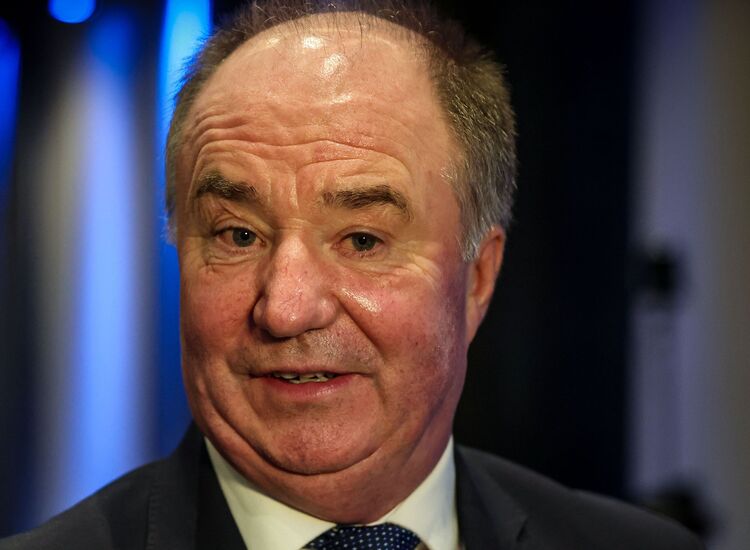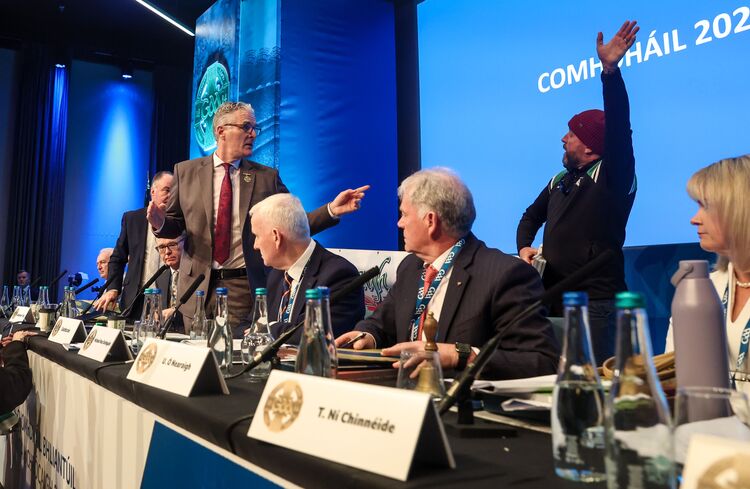"All's Well That Ends Well" By William Shakespeare • Shakespeare in the Park • Directed by Daniel Sullivan • Through July 31, 2011
Director Daniel Sullivan seems to have a lock on the best productions of the Public Theater's Shakespeare in the Park celebrations.
This summer, the Public has chosen two of the Bard's less frequently produced works, "All's Well That Ends Well" and "Measure for Measure," being produced in a rotating repertory in a season which will end early, with the final performances taking place on the July 30-31 weekend.
Sullivan, who has been represented by a production in each of the last six summers, opened first with "All's Well That Ends Well," with David Esbjornson following the next week with his staging of "Measure for Measure." A single cast performs both plays, working on a single set designed by Scott Pask, created to be shared by both productions.
Sullivan recently staged two splendid Central Park productions: 2010's "The Merchant of Venice," with Al Pacino starring as Shylock alongside Lily Rabe's Portia in a staging strong enough to justify a move to Broadway and a healthy commercial run. In 2009, there was a gorgeous "Twelfth Night," with stage novice Ann Hathaway giving a performance that proved she belonged on stage as comfortably as on film.
This summer, with a gentle, understated approach to "All's Well That Ends Well," Sullivan has shed fresh light on a play that's probably unknown to most of its audiences.
Sullivan opens his lovely show with a quiet, modest waltz involving the entire company, choreographed to the original music of Tom Kitt, last year's winner of Tony Awards for Best Score and Best Orchestrations for "Next to Normal."
Written in either 1602, or 1603, before 1604's "Measure for Measure," Shakespeare's rueful romantic comedy, "All's Well" gives us, in Helena, a bright young woman deep in grief because of her unrequited love for Bertram, the callow young Count of Rousillion who shows little if any sign of returning her affection.
Helena is beautifully played by Annie Parisse, while Bertram is delivered with just the right note of selfish shallowness by Andre Holland.
"All's Well" remains so seldom produced perhaps because of the undercoating of sadness and loss which it carries, with the two lovers, Helena and Bertram, each mourning the death of a father.
Helena's late father, the famous physician, Gerard De Narbon, has left her a considerable amount of medical knowledge, which she puts to good use in a bargain she strikes with the King of France, who appears to be dying.
She strikes a deal with the King: if he tries her father's medications, and they fail, she will die. If they succeed, the King will marry her to any man she chooses. The cure works, and Helena chooses Bertram as her potential bridegroom, despite his general indifference.
As a romance, "All's Well That Ends Well" is unconventional in that Bertram never shows much interest in Helena. If their relationship is to work out at all, Helena will, clearly, have to do more than her share of the work, a situation which may tend to keep the play's audiences somewhat at arm's length from the script.
As always, director Daniel Sullivan brings out all the subtlety and richness lurking in Shakespeare's text.
• • •"Bloomsday on Broadway XXX" • Symphony Space, NYC • June 16, 2011
The 26-hour celebration of Bloomsday, 2011, that began at noon on Thursday, June 16, and concluded a little before 2:00 a.m. on Friday, June 17, was the thirtieth running of the event at Symphony Space, a former movie theater on Broadway at Ninety-Fifth Street. The endeavor, as always, was "created and staged" by Isaiah Sheffer, the Artistic Director of Symphony Space.
Bloomsday, is the name of the 1904 Dublin day on which James Joyce's "Ulysses" takes place, starting with the novel's "hero," Leopold Bloom, greeting the morning in the Martello Tower, and ending with his faithless wife, Marian, called Molly, unable to fall asleep, and giving free vent to her deepest thoughts and feelings.
Her lengthy wanderings in and out of her memories and her dreams constitutes one of the greatest extended passages in all of literature, known the world over as "Molly Bloom's Soliloquy."
This year, many audience members arrived before noon, in time to hear actor Fritz Weaver open the long day as the Narrator and play Buck Mulligan.
Soon, Lois Smith had taken over as Narrator, with Malachy McCourt picking up Mulligan's story. Many of the celebrated actors who take part in "Bloomsday on Broadway" have been part of the production year after year, but Malachy McCourt is thought to be the one and only artist to have participated in all 30 Bloomsdays.
Sheffer and his colleagues have, over the years, done their best to inject a certain measure of individuality into each year's show. Once it was a study of fathers and sons, a natural considering the tangled relationship involving Leopold Boom and Stephen Dedalus.
Whatever the approach, the glories of Joyce's writing shine through, enhanced by the genuine brilliance of many of the actors involved.
There was a large and avid audience which had gathered at Symphony Space to be part of "Bloomsday." Many brought along their own copies of "Ulysses," silently reading along with the actors, despite the limited light in the auditorium.
For some of the actors, being part of "Bloomsday on Broadway" has acquired an importance well beyond merely doing a casual reading.
Among the most dedicated "Bloomsday" repeaters are performers Denis O'Hare, Keir Dullea, Mia Dillon, Kathleen Chalfant, Paul Hecht, Terry Donnelly, Mary Beth Hurt, Ciaran O'Reilly, Charlotte Moore, Frances Sternhagen, David Margulies, Boyd Gaines, Dana Ivey, Estelle Parsons, John Shea, Harris Yulin, Robert MacNeil, Michael Cerveris, and, to read "Molly Bloom's Soliloquy," Fionnula Flanagan.
"Bloomsday" is, and will remain, one of the genuine glories of New York's participation in the world of literature.










